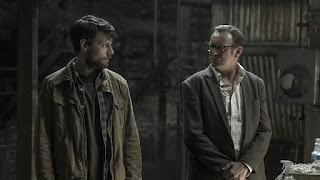“You wanna fight the devil, start by cleaning your ****ing act up.”
*References events in episodes 1-4.
As neither a fan of The Walking Dead or horror in general, I'm probably not the target market for this series. But viewing a show that’s a departure from your usual tastes—albeit during the daylight hours—can be an interesting, thought-provoking experience.
My "scary" viewing preferences lean toward mixed bag supernatural reluctant hero tales, over the more encompassing darkness commonly found in the horror genre: shows like Buffy TVS and Supernatural, where bouts of humor and friends/family-gotcha-back moments balance out the dark, gory elements.
While still a reluctant hero story at heart, Outcast is more in the vein of traditional horror because our lead is living in a state of despair. Demonic forces have screwed with his life to the point where he doesn't really have one: Kyle Barnes is barely functioning.
From the beginning the soaring, unsettling opening credits set the tone (maybe drone work?) with occasional upside down visuals and a cold blue cast.
Sound editing is important in shows that unnerve viewers. Horror and thrillers rely on the use of silence as much as sharp, sudden sounds; even commonplace audio like footsteps or slamming doors become unnatural in the hands of a good sound editor. Outcast combines haunting melodies with jarring amplified noises and oddly placed silences.
Set-wise, washed out interiors and worn, dirty surfaces make it seem as if the town is wasting away, quietly rotting behind closed doors. Even the lives of the normal couples feel unsettling and claustrophobic.
A lot of scenes take place indoors or at night. The lighting is very limited, in a carefully planned way. Even on a sunny day that shadowy sense of foreboding still hovers, as if sunshine isn't enough to penetrate the darkness at the heart of this town.
A lot of scenes take place indoors or at night. The lighting is very limited, in a carefully planned way. Even on a sunny day that shadowy sense of foreboding still hovers, as if sunshine isn't enough to penetrate the darkness at the heart of this town.
Every Man Kyle Barnes is played by Patrick Fugit, who exudes a desperate understated intensity. Turns out our lead attracts demonic forces who possess the people around him, notably the women in his life.
The role of women in this series is probably the least appealing element. Most only exist in the story as extensions, or in relation to, the male characters, and are generally victims in some way.
Kyle's mother's state, whether in the past or the present, disturbs her son: possessed or vegetative, she is still trapped in her body and unable to communicate. Flashbacks return us to the lead’s childhood quite often, and flashbacks are also used in other parts of the narrative. (Quite a popular storytelling tool with the writer’s here.)
Kyle is helped by the Reverend, and this brings up an interesting point in the show's world building: humanities inability to accept the supernatural is what really allows demonic forces to gain a foothold. How can our leads fight a war that most of the town refuses to acknowledge? Faith is a weapon for one side, while denial aids the other.
And of course the characters battle their inner demons—pun intended—as much the supernatural variety.
Just a few episodes in, and great guest stars like JR Bourne (Teen Wolf, Arrow, Stargate, UnREAL, basically an endless CV of awesome shows) and Scott Porter (Hart of Dixie, The Good Wife, Friday Night Lights) start appearing. Brent Spiner rocks up as the nefarious character, playing the part with relish.
Outcast leaves an overall impression of decay and despair, with psychological horror prevailing over physical horror, although there are gore porn elements, including mutilated animal parts, possessed people, and dead ones. Everything is shadowed, including the hearts and minds of the town.
Kyle and Reverend Anderson have their work cut out for them, but the Reverend recognizes Kyle as a weapon capable of pushing back at the dark, and Kyle now knows the supernatural entities have a reason for their fascination with his life—one he's determined to discover.
The real question is, can Kyle and the Rev keep it together long enough to push the enemy back? Exorcism seems to bring out impulse control issues; both are coming unglued at the psychological seams, and the pressure will only intensify.



